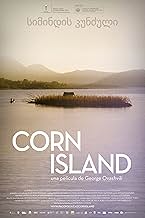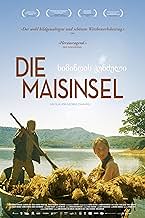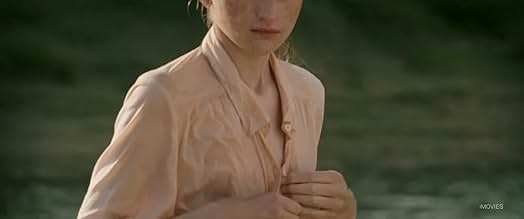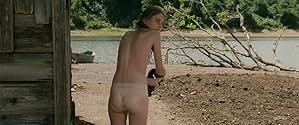IMDb RATING
7.4/10
4.8K
YOUR RATING
The river creates and the river destroys in an eternal cycle that even man can't escape.The river creates and the river destroys in an eternal cycle that even man can't escape.The river creates and the river destroys in an eternal cycle that even man can't escape.
- Director
- Writers
- Stars
- Awards
- 23 wins & 12 nominations total
- Director
- Writers
- All cast & crew
- Production, box office & more at IMDbPro
7.44.8K
1
2
3
4
5
6
7
8
9
10
Featured reviews
Beautiful Minimalism
Every year the Enguri River drops to reveal small fertile islands. Because the river marks the natural border that separates Georgia from Abkhazia, these islands are unclaimed territory. Peasants come every year to live on them during the growing season, attempting to harvest enough corn to survive the winter. Two problems face them; the fact that the two nations have been in some form of conflict since the 90's and the rising waters of the Enguri.
Clearly influenced by the likes of Dreyer and Bela Tarr, Director George Ovashvili's slow-burning, minimalist thriller takes place entirely on and around one of these tiny islands. We follow an old man, referred to only as Grandpa, and his grand-daughter as they methodically bring supplies to the island and construct a small shack. They will have to live on this island in order to tend to and protect their little patch of corn.
The film is low on plot and with nearly no dialogue and yet the sweeping cinematography gives the film an epic tone. This island means everything and nothing. The river creates and the river destroys. The island is a microcosm of man against nature, of the political instability of the region and of life itself. The amount Corn Island is able to achieve with so little is commendable.
A grand achievement, Corn Island hints at a bright future for Georgian cinema and puts George Ovashvili on the radar as a director to watch.
Clearly influenced by the likes of Dreyer and Bela Tarr, Director George Ovashvili's slow-burning, minimalist thriller takes place entirely on and around one of these tiny islands. We follow an old man, referred to only as Grandpa, and his grand-daughter as they methodically bring supplies to the island and construct a small shack. They will have to live on this island in order to tend to and protect their little patch of corn.
The film is low on plot and with nearly no dialogue and yet the sweeping cinematography gives the film an epic tone. This island means everything and nothing. The river creates and the river destroys. The island is a microcosm of man against nature, of the political instability of the region and of life itself. The amount Corn Island is able to achieve with so little is commendable.
A grand achievement, Corn Island hints at a bright future for Georgian cinema and puts George Ovashvili on the radar as a director to watch.
Very Good Drama.
I actually stumbled upon this film by accident. In my search for all things horror, I came across "Corn Island" somewhere. Maybe there is another "Corn Island" movie lurking about, but this definitely wasn't it. About 15 or 20 minutes in, when I realized that this wasn't horror, I kept it playing anyway because it did seem interesting.
Really, it was almost a silent feature as the characters didn't speak much. What intrigued me was the Georgian setting, the picturesque cinematography, the backdrop of war, and the whole idea about planting corn on an island year after year. Acting all around was good, too.
When I was younger I spent a lot of time watching foreign language dramas from France, Russia, Turkey, Japan, Belgium, Germany, the Netherlands and other places. I think it's time to give films from Georgia my full attention, too, since they seem to rate so high right here on IMDb.
Really, it was almost a silent feature as the characters didn't speak much. What intrigued me was the Georgian setting, the picturesque cinematography, the backdrop of war, and the whole idea about planting corn on an island year after year. Acting all around was good, too.
When I was younger I spent a lot of time watching foreign language dramas from France, Russia, Turkey, Japan, Belgium, Germany, the Netherlands and other places. I think it's time to give films from Georgia my full attention, too, since they seem to rate so high right here on IMDb.
the best art film of the decade
One of the main goals of art film is to depict life in its most pure, elemental state. Yet few art movies have managed to achieve that goal with as much grace and poetic depth as George Ovashivili's Corn Island. This immaculately composed film takes the viewers on a soul-touching journey into the desolate, breathtakingly beautiful wilderness of a small island in Georgia and perfectly captures the rhythm of nature and the relation between nature and the two main characters whose daily struggles are interweaved into the light, sound and motion of nature around them. Throughout the film, the viewer can't help but feel the life-like, natural quality of every picture and scene. There are no excessive details; everything is distilled into its most natural state. The image of the old man's granddaughter sitting on the boat with a bundle of shining reed under the crisp sunlight is a precise portrait of life itself. In essence, art has blended into life, and life into art. What is more remarkable is that the director has managed to convey this profound state of life without the help of dialogue. Perhaps one could argue that it is precisely the lack of dialogue that has made this film that much more powerful and moving. A scene in the beginning where the old man fondly looks at a little bird pecking at the wood conveys a sense of elegance that no language can easily convey. Even the intermittent gunshots we hear in the background and the discovery of a wounded soldier that temporarily disrupts the tranquility of the island do not lead the film to deviate from its original artistic path. On the contrary, the tension lurking in the background elevates the humanistic aspect of the film to a new height. In the end, every human gesture and activity is dissolved into the larger nature. What we are left with is a film that touches the depth of our soul with such simplicity and gracefulness that very few films can match.
Man versus Nature. Man versus Man. A Thousand-year story
Every year, the level of the Enguri River drops to uncover islands with fertile river-bottom soil. Locals can temporarily claim these islands for a season to grow a subsistence crop. An old man with one oar in an old wooden boat slowly makes his way to just such an island. He paces it off, digs the earth, tastes the soil, decides it will do, and marks his claim with a scrap of cloth on a stick. He leaves and then returns again and again, bringing supplies including scrap lumber to build a cabin with a thatched roof and then to plant corn with the help of his granddaughter who's in her early adolescence. Almost no words are spoken.
A big part of this film is thus man versus nature. Will nature allow the old man and his granddaughter to scratch a living from this transient plot of land? This part of the film might as well be prehistoric because it's so primitive. Intentionally so.
There's another part of the film caused by the island's location: in no-man's land between the warring country of Georgia and Abkhazia, a breakaway territory. This off-screen conflict brings soldiers from both sides into the film and we have man versus man versus man.
The film takes its time in all things. It's slaved to nature's pace and the growing corn. Things unfold slowly. Some of them aren't explained. That's the way it is in real life.
If you like artistic films with beautiful cinematography, this is a film for you. If you're looking for complex ideas and twisted plots, look elsewhere. This is a primal film about conflicts in nature, conflicts between men.
A big part of this film is thus man versus nature. Will nature allow the old man and his granddaughter to scratch a living from this transient plot of land? This part of the film might as well be prehistoric because it's so primitive. Intentionally so.
There's another part of the film caused by the island's location: in no-man's land between the warring country of Georgia and Abkhazia, a breakaway territory. This off-screen conflict brings soldiers from both sides into the film and we have man versus man versus man.
The film takes its time in all things. It's slaved to nature's pace and the growing corn. Things unfold slowly. Some of them aren't explained. That's the way it is in real life.
If you like artistic films with beautiful cinematography, this is a film for you. If you're looking for complex ideas and twisted plots, look elsewhere. This is a primal film about conflicts in nature, conflicts between men.
Corn Island : A great film which shows that even a tiny piece of land can be used to make a great film.
About cinema it is said that sometimes images convey perfectly what words fail to express. When words are uttered they make sense only when they merely suit the situations for which they were spoken. This effect is shown in Georgian film "Corn Island" with utmost austerity as an old man and his young grand-daughter set foot on a small island in the middle of a river. Their sudden arrival sets off a climate of distrust in the minds of other people. This is the start of a difficult life for them as there are also others who would like to see them defeated in their mission. There are some films which develop at their own pace. It is likely that laymen would call them slow whereas true admirers of cinema would label them as poetic works of art. Corn Island is one such film which would immensely appeal anybody who appreciates cinema as a poetic art. One can see how the entire process of planting a seed until the final stages of agriculture is carried out. The origin of this poetic film can be traced back to a day in August 1992 when an Abkhazian person ordered Georgian director George Ovashvili to leave Abkhazian black sea coast. According to him the war had started.
Did you know
- TriviaIn order to find the location for this movie, the filmmakers had been looking for a real island for two years. Eventually, they realised it would be too complicated and too dangerous to film on such a place. Instead, they built the island on an artificial lake, where they could control the water level to some extent, director George Ovashvili revealed in an interview.
- ConnectionsReferenced in CT na MFF Karlovy Vary 2017: Generální reditel Petr Dvorák (2017)
- How long is Corn Island?Powered by Alexa
Details
- Release date
- Countries of origin
- Official site
- Languages
- Also known as
- Simindis kundzuli
- Filming locations
- Production companies
- See more company credits at IMDbPro
Box office
- Budget
- €1,500,000 (estimated)
- Gross worldwide
- $37,445
Contribute to this page
Suggest an edit or add missing content
























